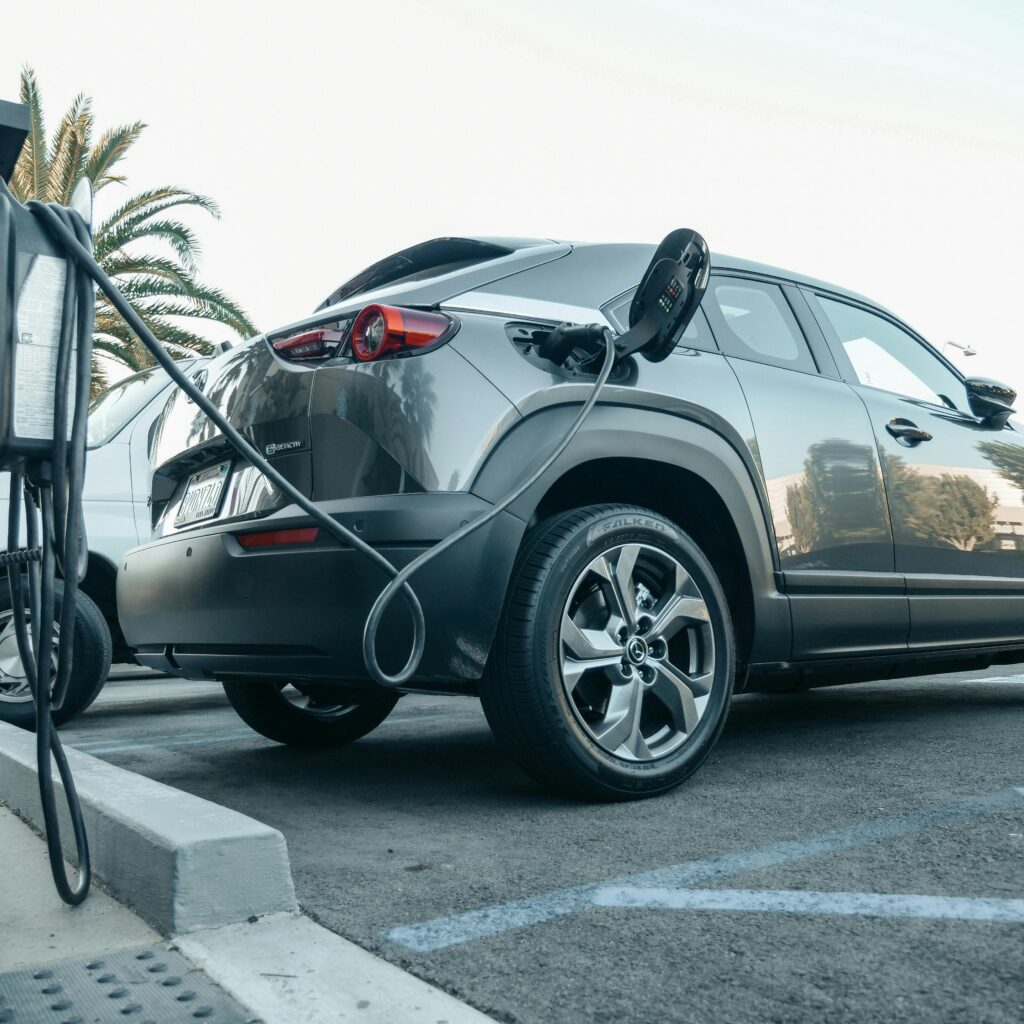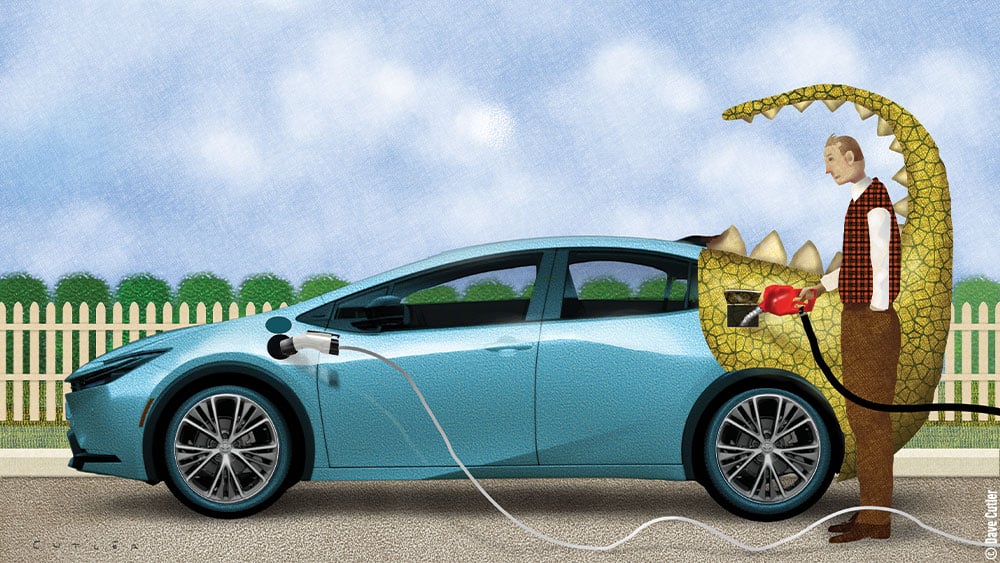Table of Contents
The automotive world is evolving fast, offering more choices than ever. Electric vehicles (EVs), hybrid cars, and traditional gasoline models each bring unique strengths and considerations. Whether you prioritize cost, performance, or sustainability, making the right choice in 2025 requires understanding the differences. Let’s dive into a detailed comparison to help you decide.
Understanding the Basics: Electric, Hybrid, and Gasoline Cars
Electric Vehicles (EVs)
Electric vehicles run purely on electric power, stored in a rechargeable battery. They have no combustion engine. Popular EVs include the Tesla Model 3, Nissan Leaf, and Ford Mustang Mach-E.

Hybrid Cars
A hybrid combines an internal combustion engine with an electric motor. It switches between or blends the two power sources for better efficiency. Well-known examples are the Toyota Prius and Honda Accord Hybrid.

Gasoline-Powered Vehicles
Gasoline cars rely entirely on a combustion engine, using petrol as fuel. They’ve been the backbone of transportation for over a century, covering a range from family sedans to powerful sports cars.

Cost Comparison: Which Is More Affordable?
Upfront Costs
- Electric vehicles typically have a higher purchase price due to battery costs.
- Hybrids are more affordable than EVs but costlier than gasoline models.
- Gasoline cars usually offer the lowest upfront prices.
Long-Term Savings
- EV owners enjoy lower running costs thanks to cheap electricity and minimal maintenance.
- Hybrid drivers benefit from better fuel efficiency, lowering gas expenses.
- Gasoline cars generally have higher lifetime fuel and maintenance costs.
Fuel and Energy Efficiency: Powering Your Drive
Electric Efficiency
Highly efficient, converting around 77% of energy from the grid to power at the wheels. They also have lower running costs compared to fuel-based cars.
Hybrid Efficiency
Use regenerative braking and battery power to reduce fuel consumption, making them ideal for city commutes with frequent stops.
Gasoline Efficiency
Gas-powered vehicles are less efficient and suffer from idle fuel waste, contributing to higher costs and emissions.
Maintenance and Longevity
EV Maintenance
Have fewer moving parts. No oil changes, no spark plug replacements, and no exhaust repairs. Battery longevity typically extends 8–10 years or more.
Hybrid Maintenance
These require maintenance for both engine and electric components but generally have lower costs than conventional cars. Regenerative braking also reduces brake wear.
Gasoline Maintenance
Traditional cars demand frequent oil changes, fuel system checks, and engine upkeep, making them more maintenance-heavy over time.
Environmental Impact
Electric Sustainability
These produce zero tailpipe emissions. When charged using renewable energy, they offer the cleanest transportation option available.
Hybrid Emissions
Hybrids emit less carbon dioxide than gasoline cars but still rely partially on fossil fuels.
Gasoline Pollution
Conventional vehicles contribute significantly to air pollution and global warming through high CO2 emissions.
Performance and Driving Experience
Driving an EV
Deliver instant torque and a silent, smooth ride. The absence of gear shifts enhances acceleration and responsiveness.
Hybrid Experience
These offer a comfortable and balanced ride, switching seamlessly between electric and gas power depending on speed and conditions.
Gasoline Driving Feel
Gasoline engines provide a traditional driving sensation, often preferred by enthusiasts for their familiar engine roar and robust acceleration.
Charging and Refueling
Charging an Electric Car
Home charging offers convenience but can take several hours. Public fast-charging stations are expanding quickly for faster top-ups.
Hybrid Refueling
Most hybrids do not require plugging in. Refueling at a gas station is quick and easy, similar to a traditional car.
Refueling Gasoline Cars
Filling up a petrol vehicle is fast and widely accessible but comes with the cost of ongoing fossil fuel use.
Resale Value and Market Trends
Electric Vehicle Resale
While earlier EVs depreciated quickly, today’s models (especially Teslas) maintain strong resale value as demand surges.
Hybrid Car Resale
Enjoy stable resale performance due to their practicality and growing popularity.
Gasoline Vehicle Depreciation
Values are dropping faster as countries adopt stricter emissions policies and electric alternatives become mainstream.
Government Incentives and Regulations
- Electric vehicles often qualify for significant tax credits, rebates, and reduced registration fees.
- Hybrids may also receive partial incentives.
- Gasoline cars face tightening regulations and increasing environmental fees in many regions.
Future Outlook: What’s Next?
The Rise of Electric Vehicles
Automakers are rapidly investing in electrification. By 2040, EVs could dominate global car sales.
Hybrids as a Bridge
Hybrid cars will continue serving as a transitional option for buyers who aren’t ready for full electrification.
The Gradual Phase-Out of Gasoline
Petrol-powered vehicles will decline as stricter environmental laws and better alternatives take hold.
Which Vehicle Is Right for You?
Choose an EV if:
- You want zero emissions and lower running costs.
- You have reliable access to charging stations.
- You mostly drive in urban areas.
Choose a Hybrid if:
- You prefer improved fuel economy without full dependence on charging.
- You drive a mix of city and highway routes.
- You seek a balance between cost, efficiency, and convenience.
Choose a Gasoline Car if:
- You need the lowest upfront cost.
- You often travel in remote areas with limited charging infrastructure.
- You enjoy traditional engine performance.
Final Thoughts
Choosing between an EV, hybrid, or gasoline vehicle in 2025 boils down to your driving habits, budget, environmental goals, and local infrastructure. Electric vehicles lead the way toward a cleaner future, hybrids offer a practical compromise, and gasoline cars remain relevant for now — but their time is limited.
Evaluate your needs carefully to invest wisely in your next ride!
For more info regarding the subject, visit EV vs. Hybrid vs. Gas: Which Vehicle Is Right for Your Needs
For more interesting info, visit 5 Tenacious Impacts of Electric Vehicles on Car Manufacturers – AutoUstaz

 Cart is empty
Cart is empty
Leave A Comment